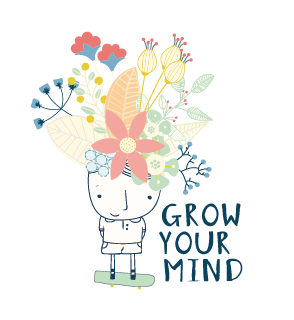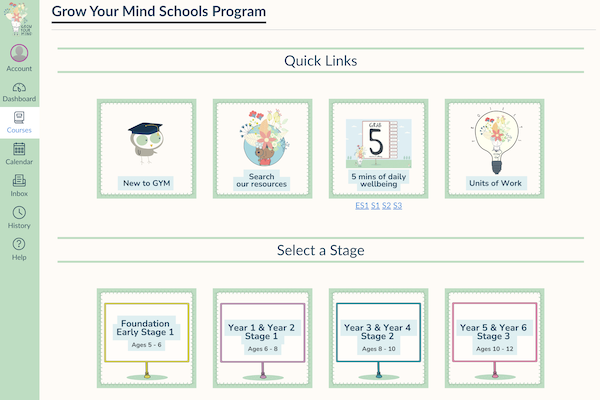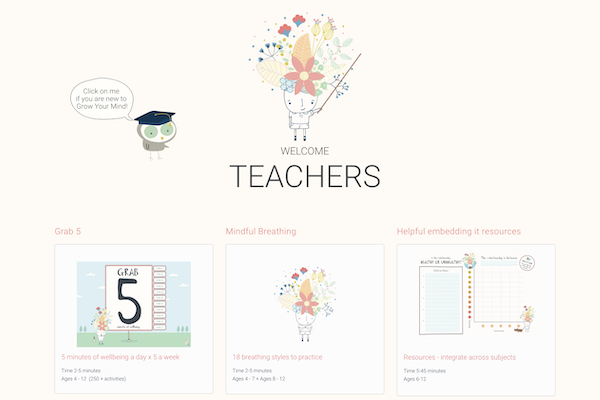
“Stories are data with a soul.”
Dr Brené Brown
5 years ago we started Grow Your Mind. Immediately we could see its impact. 12 year old boys, frequently in trouble, were drawing stunning pictures of what it feels like to flourish. 5 year olds were telling us about the brain, their guard dog (the amygdala) and how they had learnt to calm it down with mindful breathing techniques. Educators were asking for us to create staff wellbeing content and pouring into our classes as we delivered Grow Your Mind sessions to observe. Parents were writing in to say they had seen a transformation in their child’s ability to notice the good things in life.

And then there were the stories. Stories about students who were managing conflict productively for the first time all year. Stories from parents who said they were choosing schools based on whether it had Grow Your Mind in it. Personal stories about kids like Harry, who finally found the words to describe how he was feeling at school: lonely. This supported his parents to help Harry make better choices because his feelings had been identified and validated.

Having studied public health, I was acutely aware of the importance of measuring impact. We were a tiny social venture at the time and so we began gathering data from kids receiving Grow Your Mind at their school. We used basic pre and post survey evaluations where we asked students to rate their confidence, their awareness and their knowledge of mental health. We were thrilled with what the kids were saying. At one public school in Sydney we saw a 95% increase in the confidence levels of children’s knowledge of how to take care of their mental health, since starting Grow Your Mind.
The positive feedback kept pouring in via emails, social media and parenting pages. Out of the blue we would receive a message such as this from an administration and enrolments officer at a small primary school after completing our staff resilience course:
“I feel more focused on being mindful of the blessings each day and have felt my mood brighten as I see the beautiful around me and appreciate the little special moments each day.”
Sue Honey
Or this from a principal:
“That was without a doubt the best PD I’ve done for many years. Thank you for giving us a renewed sense of what wellbeing is and how to look after ourselves and our students.”
Melanie Bryden
We love qualitative research as it gives you rich, detailed, and often emotionally driven insights. We knew our in house quantitative surveys were giving us a broader, full view, based on the numbers. The feedback and data was overwhelmingly positive. Our content is grounded in positive psychology, public health and social and emotional learning research. But we knew, we needed an external review from a reputable body to really prove what we were seeing and hearing. We wanted independent
quantitative research to examine what we believed to be true:
Grow Your Mind boosts resilience and feelings of mental wellbeing in children and educators who receive the program.
Having research informed evidence for the impact of our program is crucial to what we do and our vision for the future. We want to show the world how simple and yet effective Grow Your Mind is as a whole school program. When the opportunity presented itself with the psychology department from the University of Wollongong (UOW) we jumped at it! We meticulously planned, we developed our gold standard for delivery:
- Staff wellbeing training
- Staff implementation training
- Access to online education content
- Physical wellbeing posters displayed in classrooms
- 1 explicit wellbeing lesson a week
- 2 -5 micro moments of wellbeing under 5 minutes
- 1 character strength focus
Participants were 32 teachers and 657 students across 25 classrooms from three schools. Classes were matched and then randomly assigned to either participate in the Grow Your Mind program or continue with their routine practice. The evaluation focussed on the extent of pre- to post-intervention change in mental wellbeing for students and teachers who participated in the Grow Your Mind program, relative to a
business-as-usual waitlist control group. We were ready to launch.
And then… COVID 19 hit! And hit hard! Schools went from places where we gathered physically to online learning. This meant the entirety of the Grow Your Mind program shifted too and became an online offering.

Full disclaimer: we were worried. Mental health and wellbeing had been measured BEFORE online schooling. Students would now be at home with potentially stressed out parents and siblings, not able to freely do the things they had once loved. Plus our program is designed for face to face learning. What would the repercussions be? We were holding onto hope, as during the course of the study we started hearing from teachers who were taking part in the research, such as Year 6 educator Daniela Orlando:
“I cannot tell you how much we appreciate the timing of implementing Grow Your Mind. My students are loving following the lessons during online learning and having really mature discussions about their feelings. They are confidently using the language of the brain and the animals and are also starting to make connections with the different behaviours regulated by each.”

And this one from Year 5 teacher Beth Turner:
“The timing of this program is hugely beneficial. The students share their thoughts and emotions on the topics and can provide positive solutions to real life situations. The students are able to reflect on their mindset and be more positive to help them through this difficult time. The Humdinger Grab 5 is definitely a favourite and helped us all to laugh. In particular, the language learnt has begun to be used in other lessons and situations, whether it was needing to activate their sifting sooty or elephant, calm their guard dog, thinking like a dolphin or working out where they were on the growth mindset tree.”

We crossed our fingers and hoped that this would be reflected in the numbers. Well, we are delighted to report that students’ responses to validated surveys indicated positive impacts for those whose class teachers participated in the Grow Your Mind program. These included:
- Positive gains in physical and psychological wellbeing
- A reduction in negative effect
- An increase in the quality of the child’s interactions with others
- An increase in the child’s sense of belonging and engagement
The numbers confirmed our theory. Our program makes a difference for students’ social and emotional wellbeing. The data trends that emerged from this evaluation states that the Grow Your Mind program generated positive changes to mental wellbeing, but also for buffering against negative affect and its consequences. This is an important mechanism in facilitating ongoing growth and mental wellbeing, which, in turn, may support children’s development of optimism, connectedness, emotional competence and resilience, both at school and in their everyday lives.

So other than shouting it to the roof tops, what will we do with this research from the UOW? We will continue to create innovative, playful and authentic resources, content and courses for children, educators and families. We are armed with the confidence that our program helps change the narrative of what mental health is and is not. Simply meaning: mental health is not just the absence or presence of ill health. We all have mental health, it can be fantastic , terrible and somewhere in between. Grow Your Mind wants to see children knowing how to look after their mental health with the same awareness they may have of nurturing their teeth and preventing dehydration!

Our vision is to take this research and validate the fact that prevention is easier than cure AND these conversations must start early. We want to nurture lifelong, curious and resilient learners and we now know we have the program to do just this


